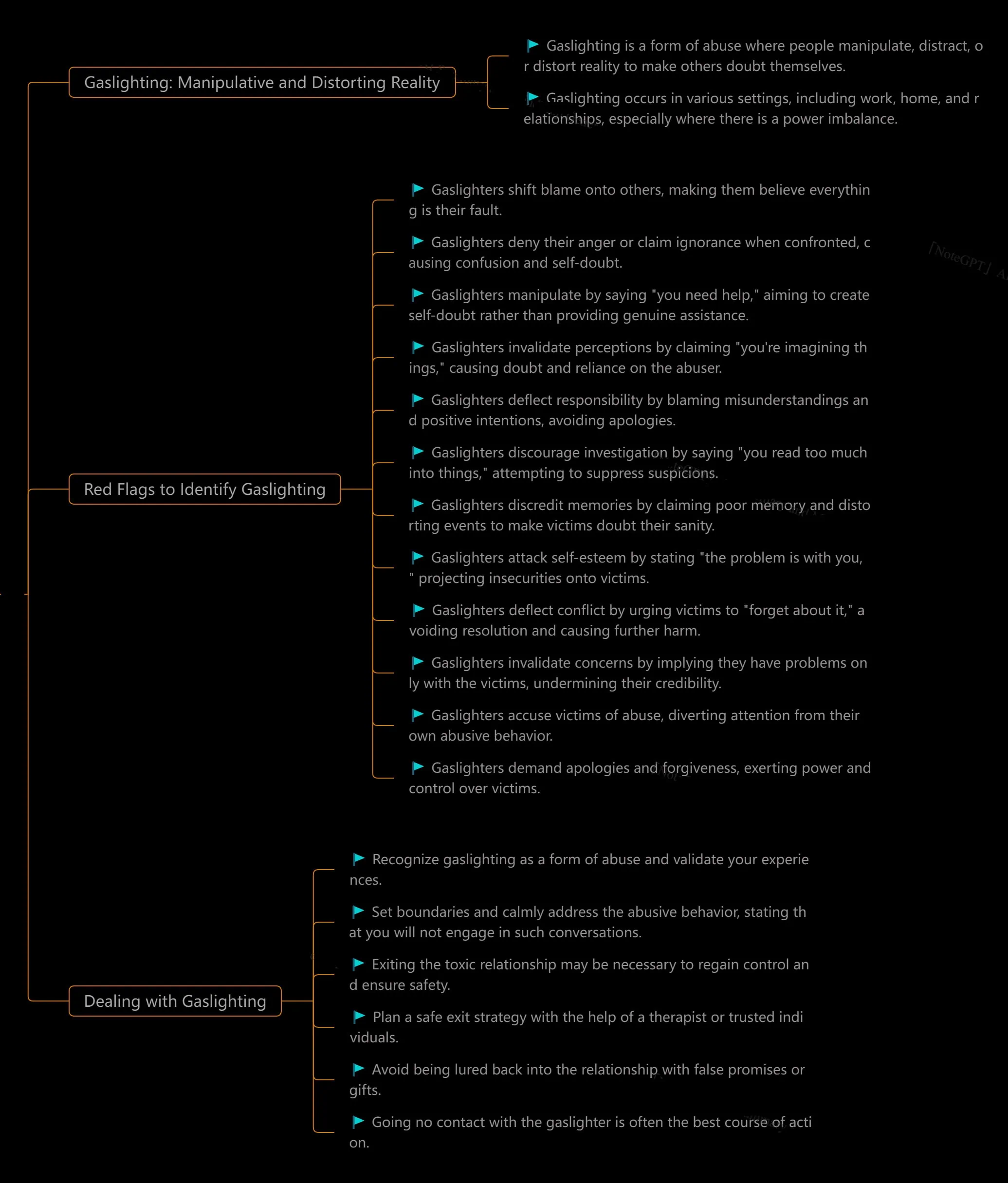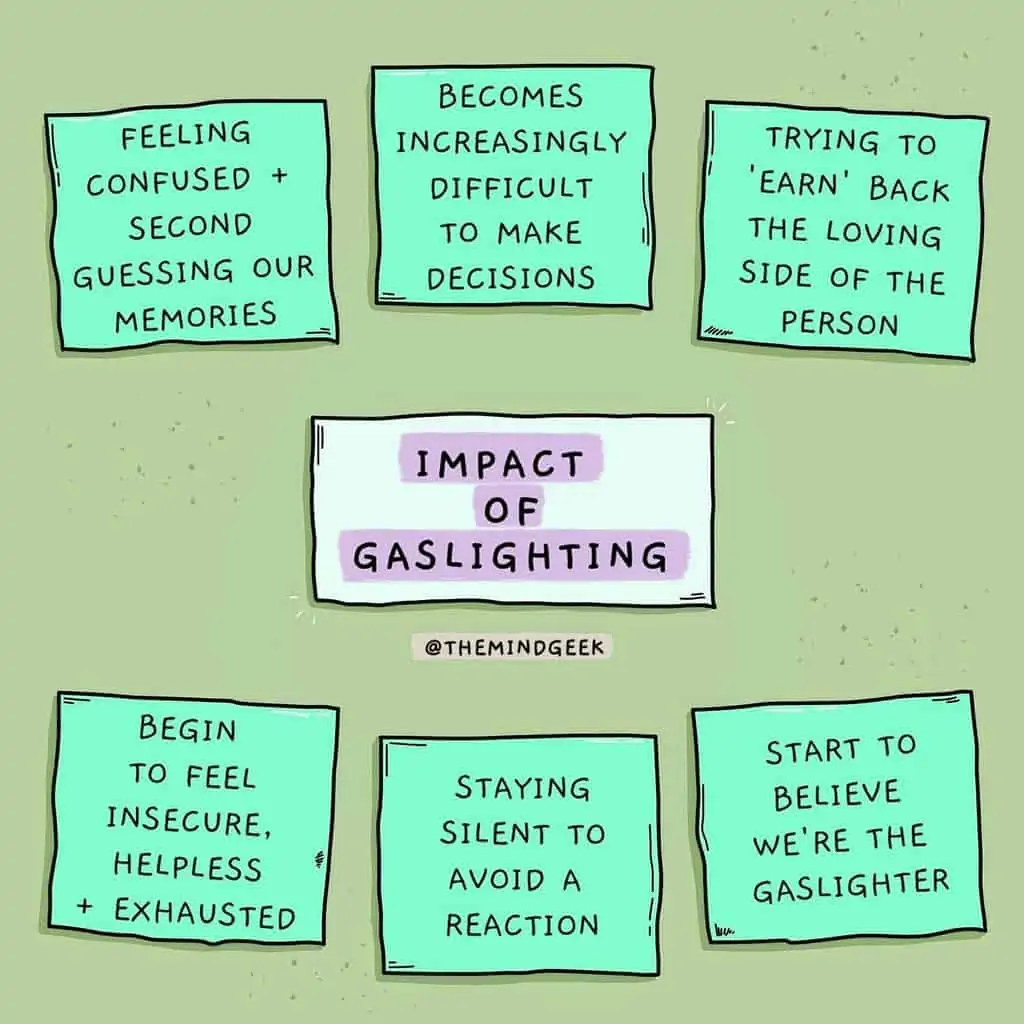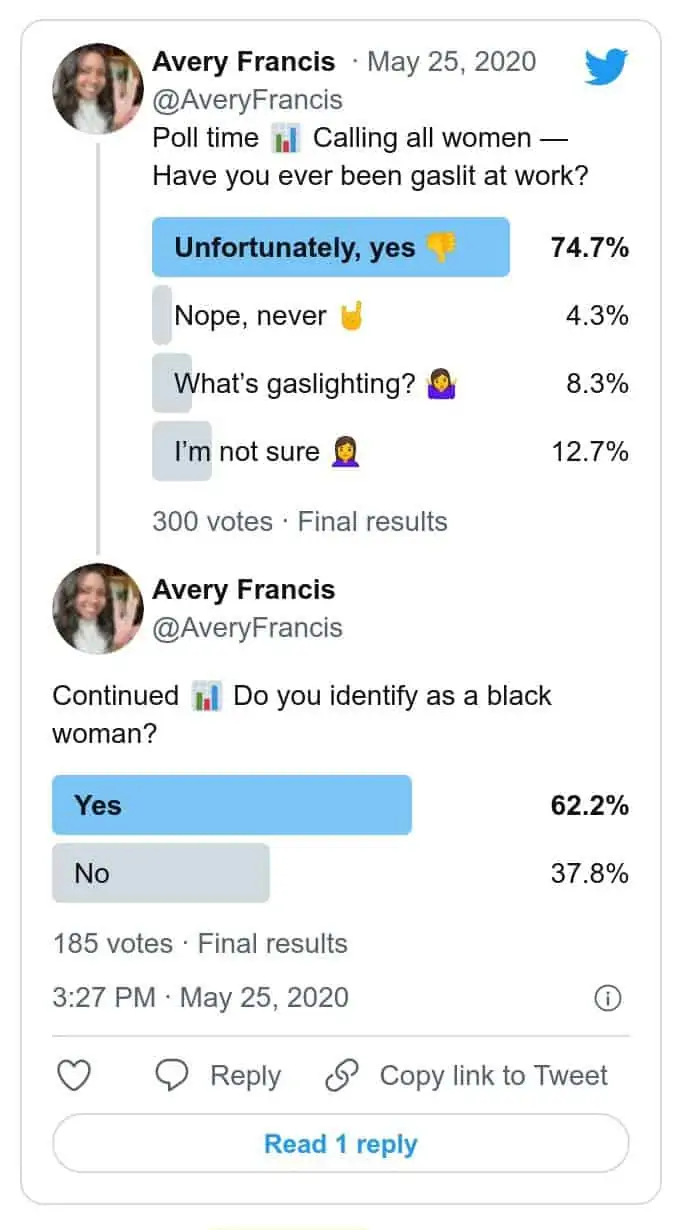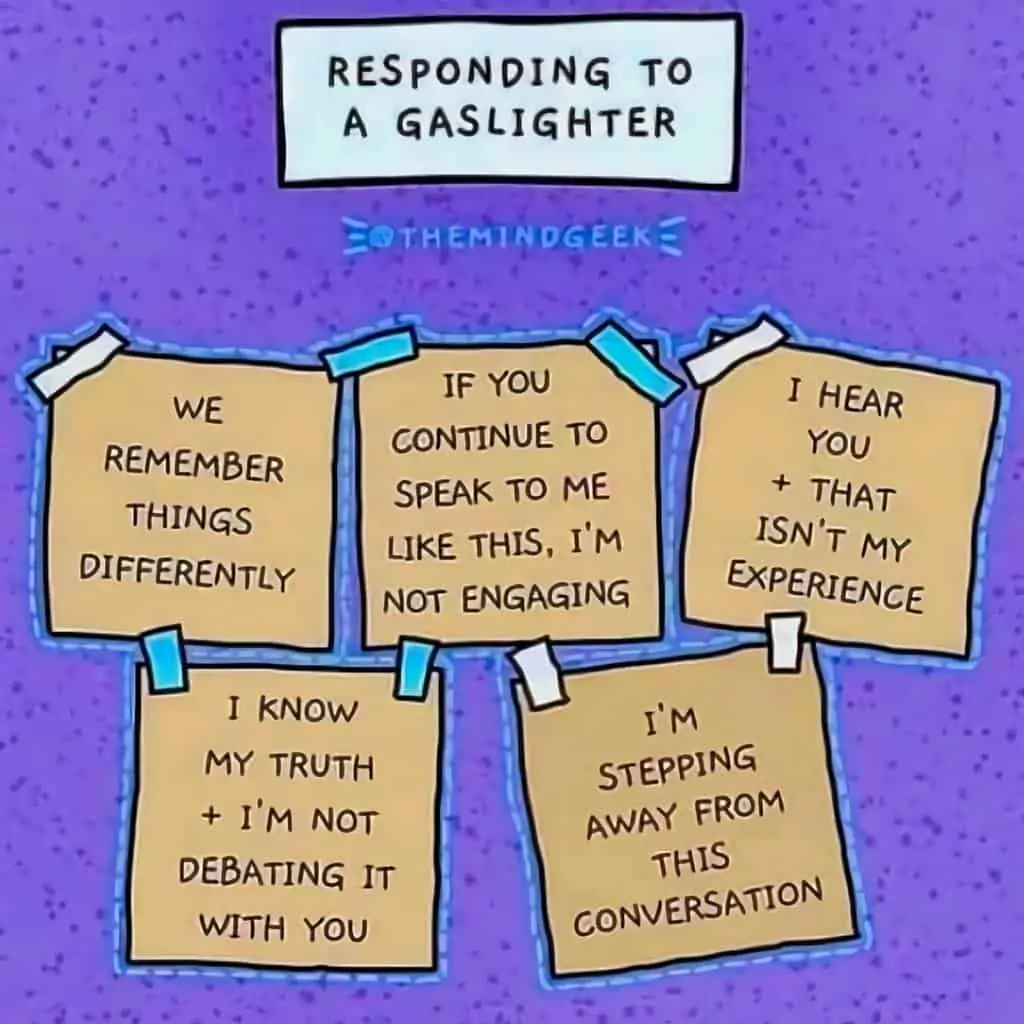Gaslighting in relationships is a mind manipulation technique that makes the victim-partner feel like they are going insane.
Gaslighters are “mind-control monsters” who tell their victims outright lies, discredit their reasoning, twist their reality, and convince them that they are descending into insanity.
A gaslighter takes away your control and say in a relationship to the point where you are hesitant to make any decision without their approval.
But why do people gaslight? More importantly, how can you safeguard yourself from it?
By the way, do you know how many types of gaslighting are there (four or six)?
What Is Gaslighting In A Relationship
Gaslighting in a relationship involves manipulating a partner’s perception of reality. As a result, the victim partner starts to doubt their own memory, judgment, and sanity, and becomes indecisive. When the gaslighter’s lies are exposed, they invent twisted interpretations to justify their acts and blame the victim.
Gaslighting is “to make someone question their reality.”

Even though gaslighting is an exploding topic, the American Psychological Association (APA) still considers the term a colloquialism. The APA views gaslighting as:
A term that “once referred to manipulation so extreme as to induce mental illness or to justify the commitment of the gaslighted person to a psychiatric institution but is now used more generally.”

It’s gut-wrenching to hear someone say how they suffered from being in a relationship with a gaslighter. The following may break your heart:
Every good thing I did was dismissed, put down, ignored or twisted. Every perceivable flaw was magnified and kept fresh in everyone’s mind.
This constant degradation was so intense that my son still thinks it’s normal to send me to my room if I bother him. He’s 13, I’m 47.
After years of gaslighting combined with down comparing (downward comparison), belittling, blame shifting, projecting, withholding of affection, constant invalidation, emotional neglect and abuse, and opportunistic attacks at any sign of vulnerability, I began to have panic attacks, which she quickly learned to trigger at will and then totally deny that she had done it.
All this served to eventually cause me to lose almost all trust in my instincts and judgment.
— Kress Haynes on Quora
Why Do People Gaslight In Relationships
Gaslighting occurs in close relationships when one person has more power than the other. This power imbalance allows the gaslighter to manipulate the person they are related to through forceful deceit and lying. Gaslighters can get away with their lies because their victims are often too scared or weak to fight back.
A modern, emerging notion is that gaslighting is rooted in social inequities, particularly based on gender bias, racism, and nationalism.
This psychological abuse is frequent in power-driven relationships, like those with a narcissist, whether personal, leadership, or corporate.
1. Gaslighting in relationships is mostly caused by a power gap between the partners.
Currently, experts believe that gaslighting is a form of emotional abuse borne of a power imbalance.
Gaslighting occurs when the more powerful partner in a relationship forces the vulnerable partner to believe in a manufactured reality instead of their own.
There are not many peer-reviewed studies on gaslighting, since many researchers think such experiments would be unethical.
So, the truth is, we still do not fully understand why gaslighting happens. Much of what we know about it comes from anecdotal reports from clinicians.
In many cases, the gaslighter in a relationship wields financial influence over the non-working or lower-paid partner.
2. Gaslighters project their unwanted negative emotions on the victim from their power position.
According to a 1981 review in The Psychoanalytic Quarterly, gaslighting may be a mechanism for people to project their conflicts or emotions onto others.
To project is to attribute one’s own undesired traits or unwanted emotions to others. So, an anxiety-ridden person may tell their partner, “You’re always anxious.”
Similarly, a gaslighter may retort, “You’re always feeding me lies.”
This could explain why cheaters often accuse their spouses of cheating: to make their actions appear less awful by assuming that their partner felt or behaved similarly.
When confronted, the gaslighter denies doing anything wrong. Psychologists have reported cases of spouses cheating on their partners and then denying it, even in the face of solid evidence (Gaslighting: A Marital Syndrome, 1988).

3. Gaslighting frequently involves victimizing diversity — gender, racial, and institutional.
Gaslighters make use of gender stereotypes, as well as racial, regional, and institutional imbalances, against victims to manipulate their realities.
In power-laden intimate relationships, the gaslighter hinges on the association of femininity with irrationality.
A 1994 study published in the journal Psychoanalysis and Psychotherapy suggests that a gaslighter is actually trying to control their own emotions by controlling their interactions with others.
When a gaslighter damages their victim’s ability to fully make sense of what’s going on, they can seize control of the relationship and resist any uncomfortable challenges to their worldview.
Elena Ruiz, in Oct 2020, introduced the term “cultural gaslighting to describe the social and historical infrastructure support mechanisms that disproportionately promote abusive mental environments in settler-colonial cultures in order to further the aims of cultural genocide and dispossession.”
A Black woman worker is more likely to be gaslighted at the workplace.

Gaslighting In Public: Post-Truth & Whistleblower Retaliation
1. Gaslighting by Leader
Other than in intimate relationships, gaslighting can be witnessed in politics and business, particularly when a powerful leader is:
- xenophobic (hostile to people from other countries),
- narcissistic (excessively in love with their self-image), or
- dictatorial (wielding absolute power with no challengers).
American journalists widely used “gaslighting” to report Donald Trump’s many actions throughout his campaign and presidency.
- Gaslighting in the public domain involves creating false or alternate narratives.
- They also undermine the victim’s narratives and cover up their lies to make them sound plausible.
- Public gaslighters do not base their arguments on facts, and often label others as irrational or insane.
Post-truth politics refers to a political environment in which facts are treated as irrelevant or unimportant against beliefs and opinions when it comes to swaying public opinion.
2. Gaslighting by Boss
In a business institution, a gaslighting boss may assign responsibilities that they later deny giving.
They may try to isolate a vulnerable worker at the office, and then claim that the victim came alone, on their own accord, to malign the boss.
3. Gaslighting by State
Even governments can gaslight.
Gaslighting is a common tactic used against anti-establishment whistleblowers, most notably Edward Snowden.
Kathy Ahern writes, “Whistle-blower gaslighting creates a situation where the whistle-blower doubts her perceptions, competence, and mental state.”
Did you know there’s a List of Whistleblowers on Wikipedia?
How to respond to gaslighting?
- Effective ways to respond to gaslighting, as advised by clinical psychologists, are finding someone to authenticate the reality, keeping a record of your actions that are often held to blame, and walking away from the conversation with your perception intact.
- Show courage in speaking out at the earliest sign of discomfort of being shown a different reality. Remember, many instances of gaslighting start out as microaggressions.
- Setting healthy boundaries and being selective in trusting persons early on in relationships helps protect one from being gaslighted. Keeping self-esteem high and healthy can shield against succumbing to gaslighting behavior.
- At work, keep a paper trail or a string of emails of crucial conversations, so that you can clearly identify if your boss or colleagues are gaslighting you.
- Finally, if you find out the person is actually an extremely cruel narcissist or a pathological abuser, a safe option is to break up the relationship or refer to a psychological counselor.

Final Words
Gaslighting is only effective when there is an unequal power dynamic, and the gaslighted person has acted submissively before the gaslighter, showing them the demanded respect.
However, gaslighting lies on a spectrum; it’s not like you either have it or you don’t. Any one of us can occasionally gaslight.
It takes two to set up a gaslighting scene. The moment you, the victim, walk away, the gaslighter loses their fang. Walk out of the abusive relationship before they do.
• • •
√ Also Read: Beware of These Classic Gaslighting Phrases!
√ Please spread the word if you found this helpful.
• Our Story!